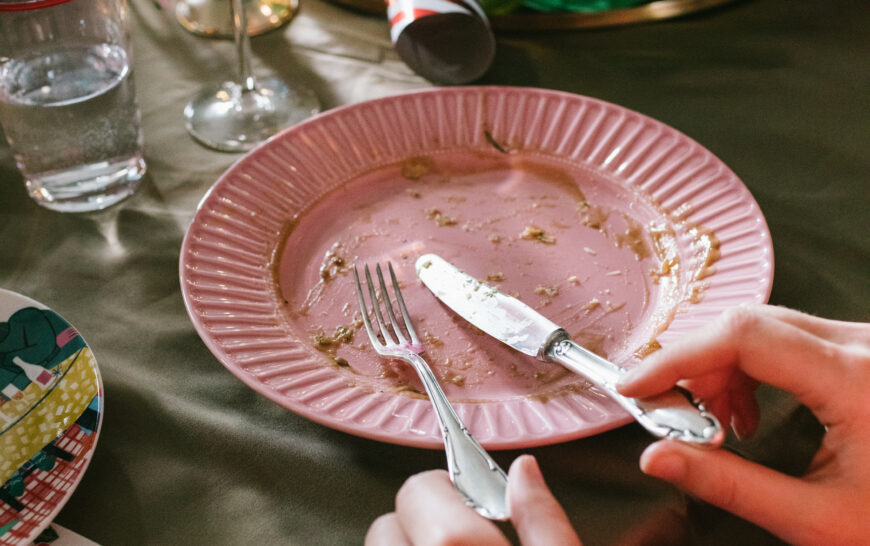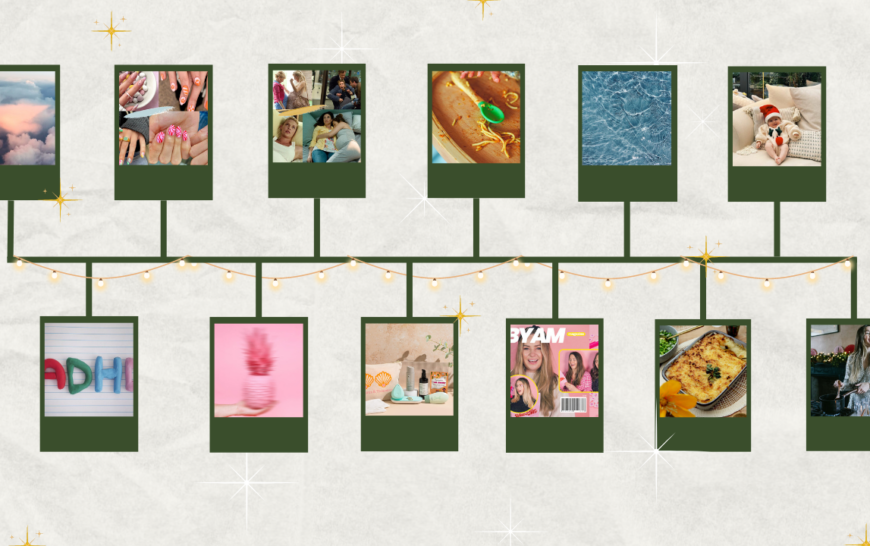
We Spoke to an Eating Disorder Specialist About Coping With Food at Christmas
For those suffering with an eating disorder or disordered eating in general, Christmas can be more of a testing time than ever for their mental health. We checked in with Emmy Brunner, to learn more about coping with an eating disorder in the run-up to Christmas...
Whilst for many of us the Christmas season and its endless buffet dinners, chocolate boxes and ‘go on just one more’ glasses of mulled wine are a reason to look forward to the festive period, for those suffering with an eating disorder or disordered eating in general, it can be a more testing time than ever for their mental health. Dr Prathiba Chitsabesan, NHS associate clinical director for children and young people’s mental health says –
“Living with an eating disorder is a constant struggle but Christmas can be particularly challenging with an increased focus on food, drink and big get-togethers, while the added pressure of New Year resolutions and the bombardment of weight loss messaging is just around the corner.”
Dr Prathiba Chitsabesan
We checked in with Psychotherapist, Author, Personal Empowerment and Transformation Coach, and Founder of The Recover Clinic, Emmy Brunner, to learn more about coping with an eating disorder in the run-up to Christmas, and gain some invaluable advice for not only making it through this period but also making it as enjoyable as possible. Emmy founded the Soho based Recover Clinic back in 2004, and since then she and her team have treated and worked with thousands of patients to “heal their trauma, eating disorders, anxiety, depression, personality disorders, low self-esteem and other mental health conditions or destructive behaviours, cycles, and patterns.” Here’s what she had to say about taking care of yourself and managing triggering eating disorder behaviours this Christmas…


Those with restrictive eating disorders may feel the need to control their intake before the festive period, whereas those with binge eating tendencies might find it difficult to control their need to overeat in a season so focused on food. How can those behaviours be managed to help an individual feel more in control and less as a victim of their ED?
If you recognise that you’re slipping into destructive behaviours, try to notice them with mindful compassion and reset your focus on being kind to yourself. Emmy Brunner
Be mindful that your ED unwell voice is gearing up to use the holiday as an opportunity to make you harm yourself with food, this could be restricting your food intake or it could be bingeing. Rather than focusing on what you are resisting and trying to battle that internal negative unwell voice, try to shift your focus on things that make you feel good. If you recognise that you’re slipping into destructive behaviours, try to notice them with mindful compassion and reset your focus on being kind to yourself. If you have enjoyed a nice amount of delicious food and drink on Christmas day – do not respond by thinking you should restrict the next day or week. Eat as well as you can every day you are on holiday to prevent binges or other unhelpful behaviours.
If it feels manageable, it may be helpful to adapt your meal plan to include festive foods, rather than only your usual foods. Find out what will be cooked and roughly when in advance. Allow time to talk over the plan with your therapist/nutritionist. Share this plan with someone you trust who will be with you over Christmas so they can help you, and others, stick to it. Be proud that you have been so well prepared!

What are some tangible steps those suffering with an ED can take to make the Christmas period feel a little more manageable?
- Focus on maintaining a structure to your food of 3 meals a day and snacks but give yourself permission to eat things that your ED wants to demonise.
- Plan ahead for difficult and challenging social situations by making sure you have support in place either before or after. Are you able to text a friend for support or drag a good pal along to something with you? Sometimes we just need someone close to us to know that we’re struggling in order to better cope with a difficult scenario.
- Be kind to yourself. This is always the answer to difficult times in life I find. We so often overlook the impact that being a little more patient and compassionate toward ourselves can have. Your ED might not disappear over the holiday season but it doesn’t completely hijack your enjoyment. What else do you love about this season? What’s your favourite movie? Christmas jumper? Game to play? Focus on those things too.
- Put in boundaries. Considering what we need at this time of year is so important. If you know that being around certain people or family members is going to be painful and triggering for you then put boundaries in around your exposure to them.
- Don’t isolate yourself. The ED loves to isolate people and it’s up to us to gently challenge this. Think about ways of staying connected to people and experiences that you love to keep you from withdrawing and feeling lonely..

How can family and friends support someone struggling with an ED this Christmas?
If you know that Christmas is going to be a challenging time for your loved one then name it and ask THEM what they might need from you. Emmy Brunner
If you know that Christmas is going to be a challenging time for your loved one then name it and ask THEM what they might need from you. So much of what isolates people is the shame that they feel about what they’re struggling with. By naming that you love and care about someone and asking them what you can do to help, you are aligning yourself with them, rather than allowing the ED to separate you both.
For those struggling themselves, know who from your support network will be available, as during the festive period they may have their own plans. This will help you to feel more comfortable reaching out, rather than worrying about disturbing anybody.
Are there any resources or helplines available for those needing support and feeling isolated during the Christmas period itself?
Our Reframe and Rise up Facebook group is facilitated by clinicians and coaches and is a great free resource for people that are struggling. You can also read Find Your True Voice which offers you a step by step guide for starting recovery on your own.
Christmas can also be difficult for those in active recovery from their eating disorder. Do you have any helpful affirmations or phrases of encouragement for those challenging their ED’s over Christmas?
- Did you know that you are worthy of love and respect because you are a human being and this isn’t based on who you might think you are or how you might have behaved in the past?
- Did you know that your ED is a strategy for coping with difficult life events and emotions and that if you develop new ways of coping you will be able to leave your ED behind?
- Although it might be impossible for you to imagine recovery, it is possible and you are not the exception.
- Useful affirmations: “I accept myself”, “I am safe”, “I am worthy of kindness”.

Eating in front of others is often difficult for those who struggle with food, which is made particularly difficult during the incredibly sociable Christmas period. How can someone manage situations like this which are out of their control?
Give yourself as many positive affirmations as you can before going into these situations. Often our unwell voice will try to control and manage these situations which draws more attention to us, thus increasing our anxiety. Keep reminding yourself that the unwell voice is trying to damage your relationship with yourself and food and wants you to isolate yourself, it’s not a voice you can trust. Consider how you would speak to someone you love in the same scenario and practice speaking the same way toward yourself.
Consider how you would speak to someone you love in the same scenario and practice speaking the same way toward yourself.Emmy Brunner
Using mental rehearsal to prepare can be incredibly useful too, thinking about the different meal and snack options that will be on offer and visualising portion sizes in your mind. This preparation will help you to make recovery-focused choices. If you are worried about eating at different times than usual, remember that you can have a snack or a bigger breakfast to help keep you going. Do not arrive at the dinner table too hungry or feeling faint or hangry – this will only increase your chances of binging or not enjoying a special time with family and friends. Consider viewing the less predictable meal structure at Christmas as practice for your future life as an intuitive and “normal” eater.
Do you have any tips for dealing with insensitive comments from family members regarding food or dieting, especially those from older generations who are typically less aware of the impact ingrained in their perception of food by diet culture?
Be mindful that the unwell voice will focus on insensitive, clumsy or even hurtful comments from people to support the negative narrative that it is telling you about who you are. If you feel yourself being triggered, give yourself permission to excuse yourself and walk away, take some deep breaths and re-engage if you feel comfortable. If you find that certain people don’t respond suitably to your cues or boundaries then ensure that you prioritise your wellbeing above anything else.
If you feel yourself being triggered, give yourself permission to excuse yourself and walk away, take some deep breaths and re-engage if you feel comfortable.Emmy Brunner
One of my favourite tricks for managing tricky or challenging comments from friends or family is to imagine that you are surrounded by a bubble of love. Although these comments might go on, see them bouncing right off you, unable to penetrate your little love bubble. Do your best not to engage in unhelpful chat and be mindful that your eating disorder will try to use scenarios like this to attack and criticise you… see it coming, stay cosy in your bubble and it will pass.

Opening up to those close to you about your eating disorder struggles can be really helpful in forming a close support system during this challenging time. What are some tips for making this conversation feel less intimidating?
Be brave. The unwell voice uses shame to silence and isolate us but vulnerability is a Patronus to shame. The more we talk, the easier it becomes and the less alone and ashamed we feel. Please know that you are not alone and that there are those of us out here who know how you feel, have walked similar paths and can help you to find a way forward.
Don’t suffer in silence this Christmas, you can find Emmy and her wonderful resources on Instagram at @EmmyBrunnerofficial and @RecoverClinic, or learn more about their therapy services and groups at therecoverclinic.co.uk.




